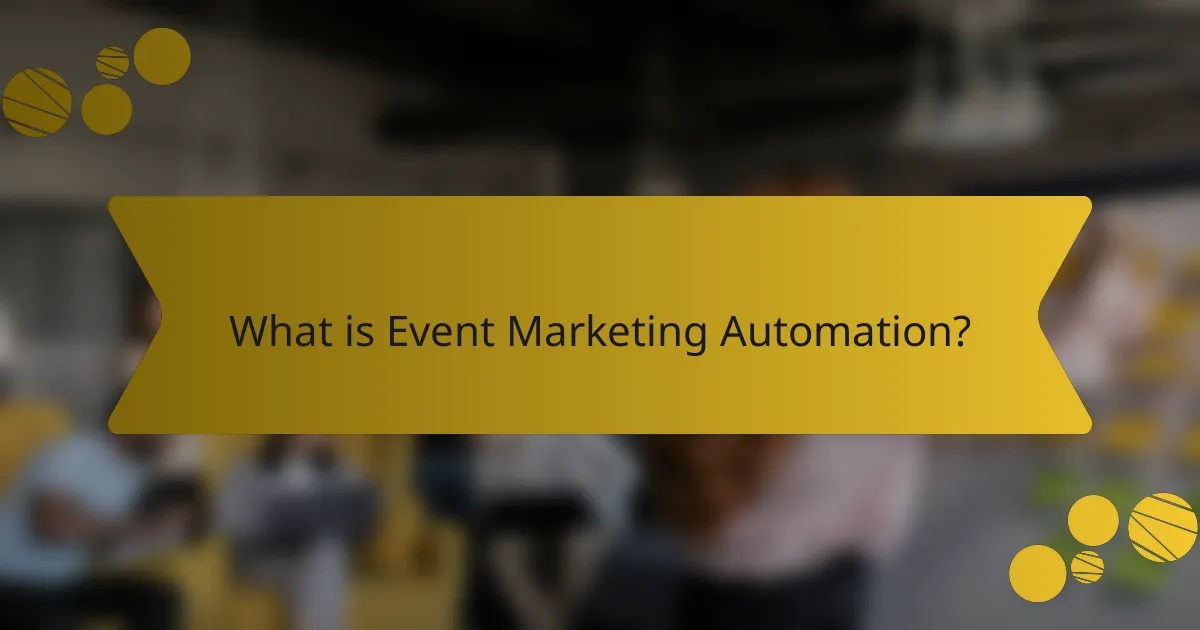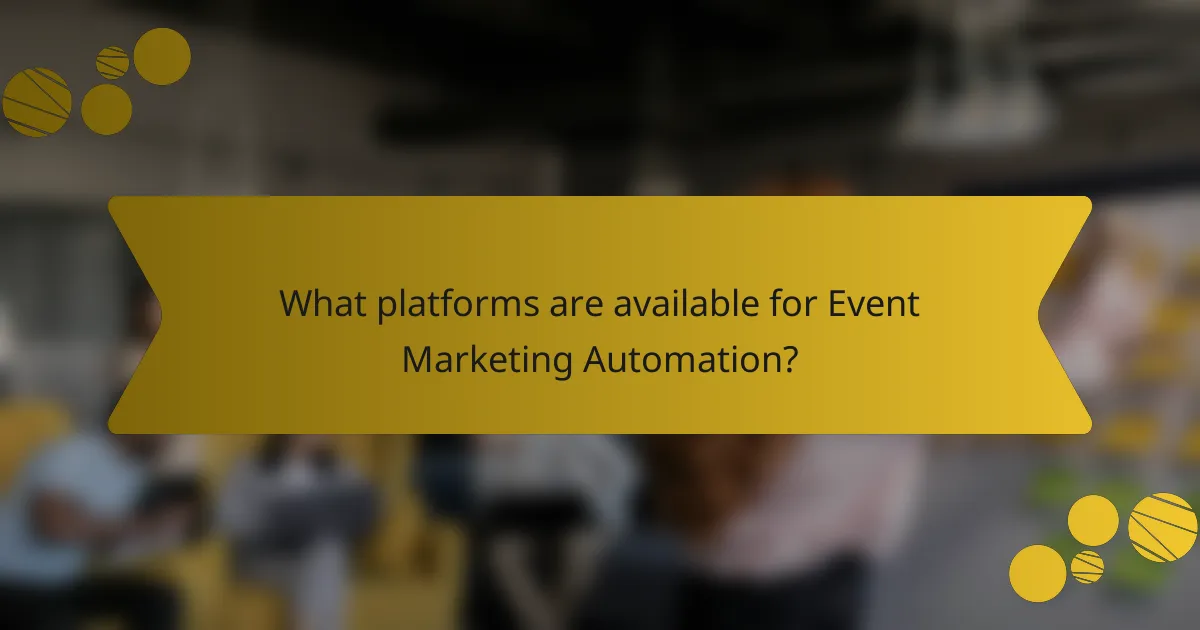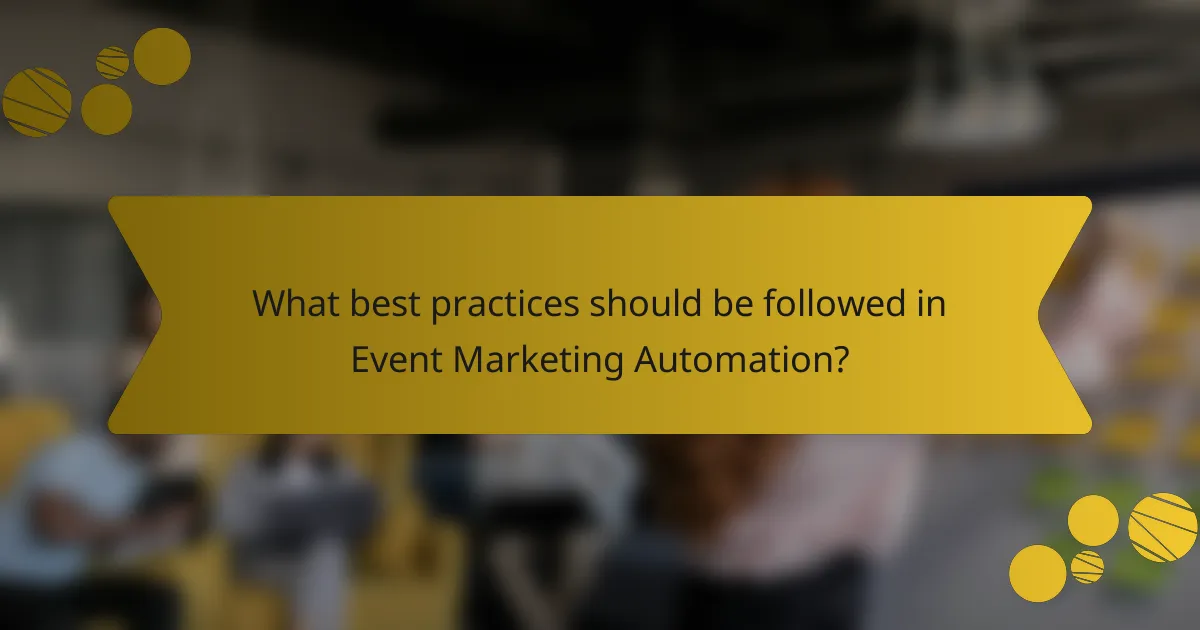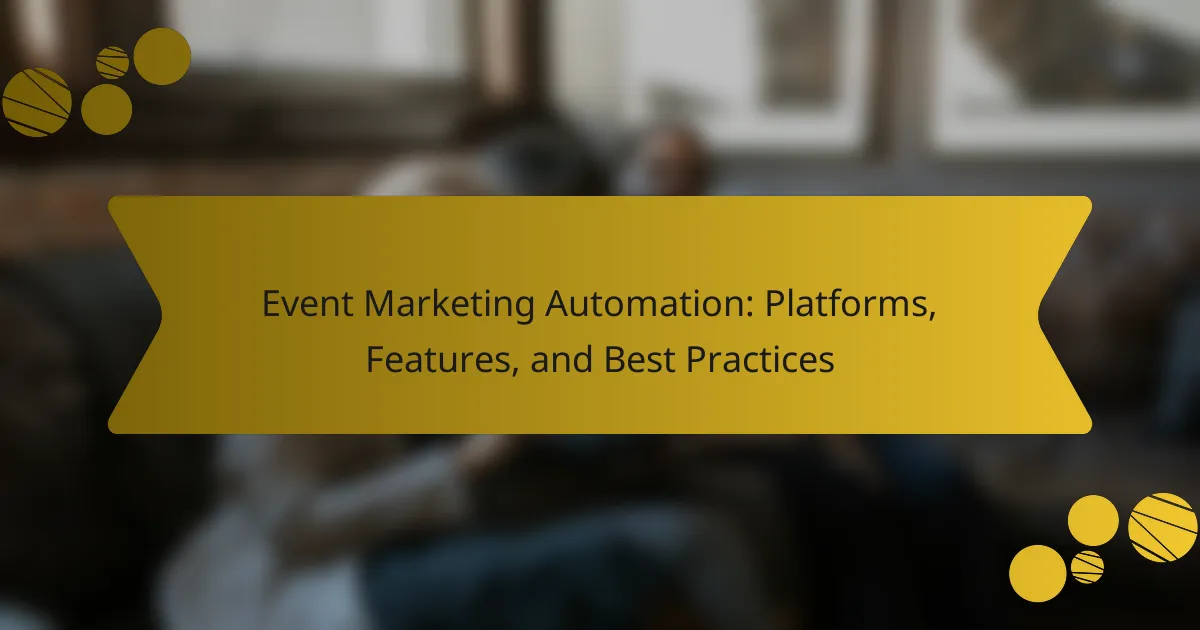Event marketing automation involves the use of software tools designed to optimize the planning, execution, and analysis of events. Key platforms such as Eventbrite, HubSpot, and Marketo provide essential features for tasks like registration, communication, and attendee engagement. Best practices in this field include effective audience segmentation, personalized messaging, the use of automated workflows, and timely follow-ups to enhance lead nurturing. Additionally, integrating social media and ensuring compliance with data protection regulations are critical for maximizing event performance and building audience trust. This overview highlights the significance of automation in modern event marketing strategies and the various tools available to enhance these efforts.

What is Event Marketing Automation?
Event marketing automation refers to the use of software tools to streamline and enhance the planning, execution, and analysis of events. This technology facilitates tasks such as registration, communication, and engagement with attendees. It allows marketers to automate repetitive processes, saving time and improving efficiency. For example, platforms like Eventbrite and Cvent provide features for email marketing, ticketing, and attendee management. According to a report by Event Marketer, 60% of event marketers use automation tools to improve event performance. This demonstrates the growing reliance on technology in the event marketing landscape.
How does Event Marketing Automation work?
Event marketing automation streamlines the planning and execution of marketing campaigns for events. It uses software to manage tasks like email marketing, registration, and attendee engagement. This technology allows marketers to create workflows that automate repetitive tasks. For example, automated emails can be sent to remind attendees about event details. Data analytics tools track engagement and provide insights into attendee behavior. This information helps refine future marketing strategies. According to a report by Eventbrite, 60% of event organizers use automation tools to enhance their marketing efforts.
What are the key components of Event Marketing Automation?
The key components of Event Marketing Automation include event registration, email marketing, and attendee management. Event registration simplifies the sign-up process for participants. Email marketing allows for targeted communication before, during, and after the event. Attendee management tracks participant engagement and provides insights for future events. Other components are analytics, which measure event performance, and integration with CRM systems for streamlined data management. These components work together to enhance the overall event experience and improve marketing effectiveness.
How do these components interact to enhance event marketing?
Event marketing components such as platforms, features, and best practices interact to create a cohesive strategy. Platforms provide the tools needed for planning and executing events efficiently. Features like registration systems and analytics enhance user engagement and optimize marketing efforts. Best practices guide the effective use of these platforms and features, ensuring alignment with audience needs. Together, these elements streamline processes and improve communication. This synergy leads to increased attendance and higher participant satisfaction. For instance, using data analytics can inform targeted marketing campaigns, which drives better results. Overall, the interaction of these components maximizes the impact of event marketing initiatives.
What are the primary benefits of Event Marketing Automation?
Event Marketing Automation streamlines the planning and execution of events. It enhances efficiency by automating repetitive tasks such as email invitations and registration management. This leads to time savings for marketers, allowing them to focus on strategy and engagement.
Additionally, it improves data collection through integrated analytics. Marketers can track attendee behavior and measure campaign effectiveness. According to a study by Eventbrite, 70% of event planners reported increased productivity with automation tools.
Furthermore, Event Marketing Automation fosters personalized communication. Tailored messages based on attendee preferences can boost engagement rates. This personalization is linked to higher attendance and satisfaction levels. Overall, these benefits contribute to more successful and impactful events.
How does Event Marketing Automation improve efficiency in event planning?
Event marketing automation improves efficiency in event planning by streamlining processes and reducing manual tasks. It automates repetitive tasks such as email invitations, registrations, and follow-ups. This automation saves time for event planners, allowing them to focus on strategic aspects. Additionally, it enhances data collection and analysis for better decision-making. Event marketing automation tools can integrate with CRM systems, providing a unified view of attendee engagement. According to a study by Eventbrite, 60% of event planners reported increased productivity due to automation features. Overall, these tools lead to more organized and effective event management.
What cost savings can be achieved through Event Marketing Automation?
Event Marketing Automation can achieve significant cost savings by streamlining processes and reducing manual labor. Automation minimizes the need for staff to handle repetitive tasks, which can lower labor costs. According to a study by the Event Marketing Institute, organizations utilizing automation reported a 20% reduction in operational costs. Additionally, automated marketing campaigns can improve efficiency, leading to better resource allocation. This allows for more budget to be directed towards strategic initiatives rather than administrative overhead. Furthermore, automation can enhance data management, reducing errors that might lead to costly miscommunications. Overall, Event Marketing Automation can provide a more cost-effective approach to planning and executing events.

What platforms are available for Event Marketing Automation?
Several platforms are available for Event Marketing Automation. Popular options include HubSpot, Marketo, and Eventbrite. These platforms offer tools for managing event registrations, email marketing, and audience engagement. HubSpot provides a comprehensive CRM integration for tracking leads and event performance. Marketo specializes in advanced marketing automation features tailored for large organizations. Eventbrite focuses on ticketing and event management solutions. Other notable platforms are Cvent, Bizzabo, and Splash, each offering unique features for event planning and execution. These platforms are widely used across various industries to streamline event marketing efforts.
What are the top Event Marketing Automation platforms?
The top Event Marketing Automation platforms include HubSpot, Marketo, and Eventbrite. HubSpot offers comprehensive tools for email marketing, social media management, and analytics. Marketo specializes in lead management and targeted marketing campaigns. Eventbrite is known for its ticketing solutions and event management features. These platforms streamline event planning and enhance attendee engagement. They provide robust analytics to measure event success. Each platform has unique features that cater to different marketing needs.
What features do leading Event Marketing Automation platforms offer?
Leading Event Marketing Automation platforms offer features such as event registration management, email marketing integration, and attendee tracking. These platforms enable seamless registration processes through customizable forms and automated confirmations. Email marketing integration allows for targeted campaigns to promote events and engage attendees. Attendee tracking provides insights into participant behavior and engagement levels. Additionally, features like analytics and reporting help organizations measure event success. Integration with CRM systems enhances data management and follow-up processes. Social media promotion tools facilitate event visibility and attendee engagement. Automation of post-event surveys gathers feedback for future improvements.
How do these platforms compare in terms of usability?
Usability among event marketing automation platforms varies significantly. Some platforms offer intuitive interfaces that enhance user experience. For instance, platforms like HubSpot and Eventbrite are known for their user-friendly designs. They provide straightforward navigation and easy access to features. Conversely, other platforms may have steeper learning curves due to complex functionalities. These include tools that require more technical knowledge. User satisfaction ratings often reflect these differences. Surveys indicate that 85% of users prefer platforms with simpler interfaces. Therefore, usability is a key factor in selecting the right event marketing automation platform.
What criteria should be considered when choosing an Event Marketing Automation platform?
When choosing an Event Marketing Automation platform, consider the following criteria: user interface, integration capabilities, scalability, reporting features, customer support, pricing, and customization options. A user-friendly interface ensures ease of use for all team members. Integration capabilities with existing tools streamline workflows and data management. Scalability is essential for accommodating growth and varying event sizes. Robust reporting features allow for data-driven decision-making and performance tracking. Reliable customer support is crucial for resolving issues promptly. Competitive pricing models should align with your budget and needs. Lastly, customization options enable tailoring the platform to specific event requirements.
How important is integration with other marketing tools?
Integration with other marketing tools is crucial for effective event marketing automation. It allows for seamless data sharing and communication between platforms. This integration enhances user experience and improves campaign efficiency. For example, a study by HubSpot found that companies using integrated marketing tools experienced a 30% increase in lead generation. Additionally, integration enables better tracking of customer interactions across different channels. This leads to more personalized marketing efforts. Ultimately, strong integration fosters a cohesive marketing strategy that drives better results.
What role does customer support play in platform selection?
Customer support is crucial in platform selection for event marketing automation. It influences user satisfaction and overall experience. Reliable customer support ensures quick resolution of issues. This minimizes downtime during critical event planning phases. Platforms with strong support typically have higher user retention rates. According to a study by Microsoft, 96% of consumers say customer service is important in their choice of loyalty to a brand. Therefore, assessing customer support can significantly impact the selection process.

What best practices should be followed in Event Marketing Automation?
Best practices in Event Marketing Automation include segmenting your audience effectively. This allows for targeted messaging that resonates with different groups. Personalization of communication enhances engagement rates. Utilize automated workflows to streamline processes and reduce manual tasks. Timely follow-ups post-event can nurture leads and maintain interest. Tracking and analyzing metrics is essential for optimizing future events. Integrating social media can amplify reach and engagement. Lastly, ensure compliance with data protection regulations to build trust with your audience.
How can data analytics enhance Event Marketing Automation?
Data analytics can enhance Event Marketing Automation by providing insights into attendee behavior and preferences. This information allows marketers to tailor their campaigns effectively. Analytics can track engagement metrics like email open rates and click-through rates. By analyzing these metrics, teams can optimize their messaging and timing. Furthermore, data can reveal demographic trends among attendees. This enables targeted marketing efforts that resonate with specific audiences. According to a study by Eventbrite, personalized marketing can increase event attendance by 20%. Thus, leveraging data analytics significantly improves the effectiveness of event marketing strategies.
What metrics should be tracked for effective event marketing?
Key metrics for effective event marketing include registration numbers, attendance rates, and engagement levels. Registration numbers indicate interest and potential audience size. Attendance rates measure the actual turnout compared to registrations. Engagement levels assess participant interaction during the event. Other important metrics are lead generation, social media reach, and post-event feedback. Lead generation tracks the number of new contacts made. Social media reach indicates how many people were exposed to event-related content. Post-event feedback provides insights on attendee satisfaction and areas for improvement. Tracking these metrics helps optimize future events and enhance marketing strategies.
How can insights from data improve future events?
Insights from data can significantly improve future events by informing decision-making processes. Data analysis reveals attendee preferences and behaviors. This information allows event planners to tailor experiences to meet audience expectations. For instance, surveys and feedback data can highlight popular sessions or topics. Analyzing registration trends can help optimize scheduling and venue selection. Furthermore, data on marketing effectiveness guides promotional strategies for higher engagement. A study by Eventbrite found that data-driven events saw a 20% increase in attendee satisfaction. Thus, leveraging insights from data directly enhances event planning and execution.
What are common challenges in implementing Event Marketing Automation?
Common challenges in implementing Event Marketing Automation include integration issues, data quality concerns, and user adoption barriers. Integration issues arise when aligning automation tools with existing systems. This can lead to delays and increased costs. Data quality concerns involve ensuring accurate and clean data for effective targeting. Poor data can result in ineffective marketing campaigns. User adoption barriers occur when team members resist using new technology. Training and support are crucial to overcome this challenge. Additionally, measuring ROI can be difficult, as it requires clear metrics and tracking systems. These challenges can hinder the successful implementation of event marketing automation.
How can organizations overcome resistance to automation?
Organizations can overcome resistance to automation by fostering a culture of trust and transparency. Clear communication about the benefits of automation can alleviate fears. Engaging employees in the automation process encourages buy-in. Providing training enhances skills and reduces anxiety. Involving employees in decision-making increases acceptance. Highlighting success stories demonstrates the positive impact of automation. Research shows that organizations with strong change management practices see 70% more successful transformations. Overall, addressing concerns and involving staff leads to smoother transitions.
What strategies can be employed to ensure successful adoption?
To ensure successful adoption of event marketing automation, organizations should implement comprehensive training programs. Training enhances user understanding of the platform’s features. Regular workshops and hands-on sessions can facilitate this learning. Additionally, providing ongoing support and resources is crucial. This can include access to tutorials, user guides, and a dedicated helpdesk. Engaging users through feedback mechanisms can also improve adoption. Organizations should regularly solicit input on user experiences. Tailoring the platform to meet specific user needs can enhance satisfaction. According to a study by the Event Marketing Institute, effective training increases user engagement by 40%.
What tips can help maximize the effectiveness of Event Marketing Automation?
To maximize the effectiveness of Event Marketing Automation, utilize targeted audience segmentation. This allows for tailored messaging that resonates with specific groups. Implement personalized email campaigns to increase engagement rates. Studies show personalized emails can lead to a 29% higher open rate. Use analytics to track performance metrics. This data helps refine strategies and improve future campaigns. Automate follow-up communications to maintain engagement post-event. Consistent follow-up can increase attendee retention by up to 40%. Integrate social media promotion to broaden reach. Events promoted on social platforms see a 20% increase in attendance. Lastly, ensure seamless registration processes to minimize drop-offs. Simplified registration can boost conversion rates significantly.
Event Marketing Automation is a technology-driven approach that utilizes software tools to enhance the planning, execution, and analysis of events. This article provides a detailed overview of key components such as event registration, email marketing, and attendee management, along with the benefits and efficiencies gained through automation. It also examines various platforms available for event marketing automation, their features, and best practices for effective implementation. Additionally, the article addresses common challenges and strategies for successful adoption, ensuring organizations can maximize the effectiveness of their event marketing efforts.
